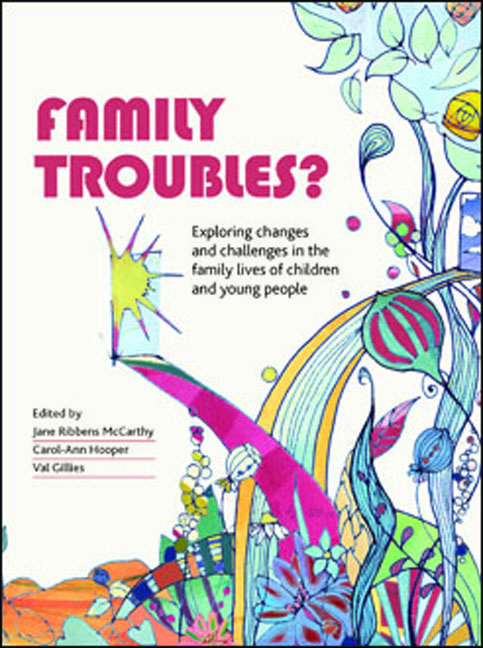Book contents
- Frontmatter
- Contents
- Notes on contributors
- Foreword
- Preface
- 1 Troubling normalities and normal family troubles: diversities, experiences and tensions
- Part One Approaching family troubles ? Contexts and methodologies :Introduction to Part One
- Part Two Whose trouble ? Conteste d definitions and practice: Introduction to Part Two
- Part Three The Normal, The Troubling And The Harmful?: Introduction to Part Three
- Part Four Troubles and transitions across space and culture: Introduction to Part Four
- Part Five Working With Families: Introduction to Part Five
- Index
3 - Representing family troubles through the 20th century
Published online by Cambridge University Press: 07 September 2022
- Frontmatter
- Contents
- Notes on contributors
- Foreword
- Preface
- 1 Troubling normalities and normal family troubles: diversities, experiences and tensions
- Part One Approaching family troubles ? Contexts and methodologies :Introduction to Part One
- Part Two Whose trouble ? Conteste d definitions and practice: Introduction to Part Two
- Part Three The Normal, The Troubling And The Harmful?: Introduction to Part Three
- Part Four Troubles and transitions across space and culture: Introduction to Part Four
- Part Five Working With Families: Introduction to Part Five
- Index
Summary
Histories of family troubles in Britain through the 20th century have been written from a number of different perspectives and have taken a range of conceptual and analytical approaches. Autobiographical and biographical accounts have thrown much light on personal experience (Sage, 2001; Harding, 2006) and the effects of welfare encounters through which families with perceived troubles were identified, regulated or supported (Steedman, 1986). Social histories of family lives have been equally revealing about the ways in which the constitution of ‘normal’ family relationships has shifted over time (Gillis, 1997; Davidoff et al, 1999; Davidoff, 2012). Tracing, inter alia, demographic, economic, political and cultural change as well as shifts in gender relations, familial ties and patterns of employment, such accounts have illustrated the significance of context not only for understanding how the norms of family lives are always contingent and in flux, but also for mapping their continuities. Other accounts have been generated in legal and policy histories concerned with the more public arenas of political intervention and professional accountability around family troubles, wherein the work of government commissions, legislative reform and public inquiries has been interrogated (Parton, 2004; Cretney, 2005). There are also rich analyses that take as their focus a particular dimension of what have been regarded as family troubles in the past, such as unmarried motherhood (Evans and Thane, 2011), bereavement (Jalland, 2010), unemployment (Burnett, 1994), disability (Atkinson et al, 2003), migration (Webster, 1998), child abuse (Ferguson, 2004) and child poverty (Platt, 2005). These variously illustrate how experiences and discourses of ‘troubles’ have changed and how, in turn, they have impacted upon and shaped the dynamics of family relationships and practices.
As a whole, this historiography points to the continuing centrality of marriage, motherhood and the male breadwinner in normative constructions of British families across the 20th century and how those whose personal and intimate relationships fell outside such constructions were stigmatised or problematised as a result (Clark, 1991; Oram and Turnbull, 2001; Houlbrook, 2005; Holden, 2007). At the same time, it demonstrates the variety and diversity of family experience and, in some instances, suggests that ‘trouble’ was a commonly experienced, though frequently silenced, aspect of family lives (Davidoff et al, 1999; Smart, 2007).
- Type
- Chapter
- Information
- Family Troubles?Exploring Changes and Challenges in the Family Lives of Children and Young People, pp. 35 - 44Publisher: Bristol University PressPrint publication year: 2013



